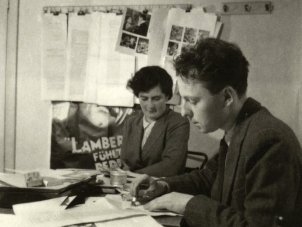Written for Sight and Sound, November 2015. — J.R.
I hope I can be forgiven for quoting myself in my first collection, Placing Movies: The Practice of Film Criticism (1993): “As I’ve discovered in my own endeavours in editing the prose of Truffaut, Welles and Bogdanovich, the best editing is usually the kind the reader is least aware of, though the supreme masters of this game – who within my experience are probably Penelope Houston and Michael Lenehan – sometimes manage to minimise the awareness of the writer as well.” Lenehan was the main editor for several years at the Chicago Reader, and Penelope’s stint at Sight and Sound was considerably longer. Over two decades later, I can add without hesitation that no editor that I’ve ever worked with has known more and taught me more about the mechanics of prose than Penelope.
But I hasten to add that my indebtedness to her goes far beyond her superb gifts as an editor. I might even say that it was her taste, above all, that drew me to her magazine in the first place, and her determination to acquire an English work permit for me – a process that I recall took the better part of half a year – that enabled me to move to London from Paris in 1974, to serve as assistant editor at Monthly Film Bulletin (under Richard Combs, a supportive boss and fine editor in his own right) and staff writer for Sight and Sound, my first major job anywhere. Although I remained there for only two and a half years (ultimately due to an encroaching, writerly homesickness for the American language that drove me to accept a teaching post in San Diego from Manny Farber), it was the best possible education I could have received anywhere for my subsequent career as a film critic, with the resources of the BFI’s Information Department providing as much nourishment as the benign influence of Penelope (as well as the assistance of such colleagues as Richard, the late Jan Dawson, David Meeker, Tom Milne, Chris Petit, John Pym, Richard Roud and David Wilson, not to mention Penelope’s wonderfully crotchety assistant Sylvia Loeb, among many others. And I should add the name of Tony Rayns, who taught me a lot).
Both then and afterwards, Penelope remained a somewhat controversial figure in the London film scene for a complicated mix of reasons, not least of which were the privileges accrued from having guaranteed state support and her resistance to some of the more radical strains in filmmaking and film criticism at the time. This eventually led to an unjust neglect of her uncommon strengths as both a critic and an editor that has lasted far too long, ignoring such virtues as her sharp intelligence, her nuanced prose, her openness to contributions from strangers with no calling cards apart from their own submissions, and her everyday kindness and geniality (which led her, for instance, to deliver mail every day to David, Richard and me while we were all picketing the BFI’s Dean Street headquarters as union members on strike). It took me longer than it should have to pick up on her shyness and her embarrassment whenever salty language was spoken, which her relative gruffness in manner tended to make less immediately apparent, but her acute sensitivity was an essential part of who she was, professionally as well as personally. This comes through especially in her review of Last Year at Marienbad for Sight and Sound, for me the finest rendering of the singular experience offered by that film that has appeared anywhere: https://jonathanrosenbaum.net/2023/05/on-a-favorite-film-review/.

